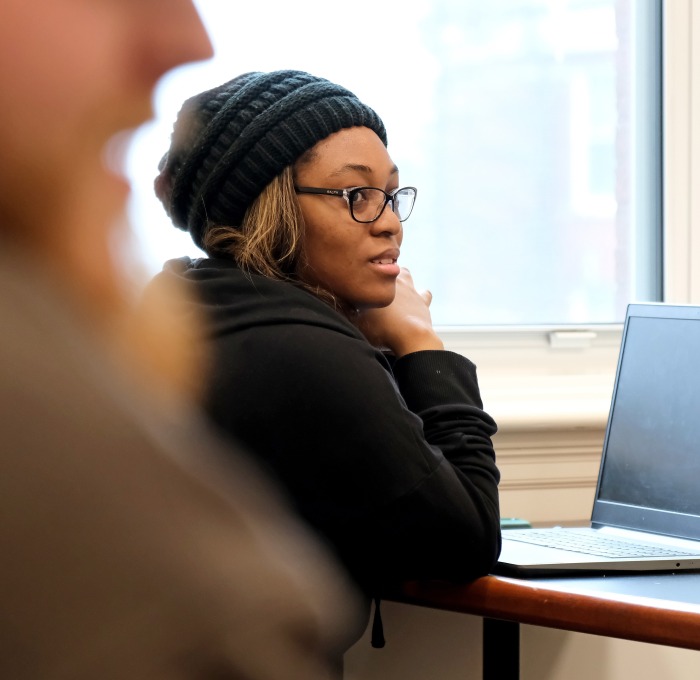
In Short
Prepare for LMHC licensure with a clinical mental health master’s degree. Gain counseling skills and real-world experience at Fitchburg State. Learn more!
By earning a master’s in Clinical Mental Health Counseling from Fitchburg State, you:
- Expand your career opportunities across diverse settings, including community mental health centers, residential treatment facilities, hospitals, and private practice.
- Gain real-world experience through 150 clock hours of course-related practicums and a 600-hour internship placement.
- Make a difference in the lives of individuals, couples, families, and groups by addressing unique challenges, promoting optimal mental health, and providing evidence-based treatment.
Program at a Glance: Train for a Meaningful Counseling Career
Effective mental healthcare starts with knowledgeable, compassionate professionals. Fitchburg State University’s Master of Science (MS) in Clinical Mental Health Counseling (CMHC) degree program equips you with the skills to diagnose, treat, and support individuals facing mental health concerns — while also preparing you to apply for Licensed Mental Health Counselor (LMHC) certification.
Earn your CMHC master’s degree, complete your clinical training, and move closer to LMHC certification today!
Program Overview
Prepare for LMHC Licensure
Fitchburg State’s MS in Clinical Mental Health Counseling program meets the educational requirements for Licensed Mental Health Counselor (LMHC) certification in Massachusetts. Graduates of the program are eligible to apply for licensure and take the next steps toward becoming a credentialed mental health professional.
Achieving LMHC licensure involves completing the required coursework and supervised clinical experience, followed by passing the necessary state exams. We ensure that you are prepared for the process through:
- Coursework aligned with LMHC licensure standards as well as state requirements for licensure
- Instruction from experienced faculty with both academic and clinical backgrounds in mental health counseling
- Training in a wide range of therapeutic orientations and techniques
- Practical clinical experience, including two practicums (totaling 150 hours) and a 600-hour internship
Program Length
Depending on your schedule, you can complete the CMHC program in anywhere from two to six years. Many students complete the clinical mental health master’s degree in three years by taking three courses per semester including some summer courses. If you plan to begin coursework in the first summer term, Fitchburg State offers an accelerated full-time option that allows you to graduate in just over two years while completing your required internship and practicum
What Can You Do With an MS in Clinical Mental Health Counseling?
A master’s in Clinical Mental Health Counseling opens the door to a career dedicated to helping individuals, families, and communities navigate mental health challenges. Licensed Mental Health Counselors (LMHCs) provide therapy, crisis intervention, and treatment planning for clients facing a range of psychological conditions. They support emotional wellness, help clients develop coping strategies, and address issues such as trauma, anxiety, depression, and addiction.
Counselors and therapists work in a variety of professional settings, including community mental health centers, hospitals, private practices, schools, rehabilitation facilities, and nonprofit organizations.
Fitchburg State alumni work for employers such as:
- The Bridge
- Community Health Link
- Counseling and Assessment Clinic
- Heywood Hospital
- LUK Crisis Center
- Perkins
- Private practices
- You Inc.
Admission Requirements
Ready to earn your master’s in Clinical Mental Health Counseling? Submit the following materials to apply:
- Official transcript of a bachelor’s degree from a regionally accredited institution
- Three letters of recommendation (References must be from professional sources, and one must be an academic reference.)
- Professional resume
- Official transcripts of graduate level coursework from a regionally accredited institution (if applicable)
- Graduate application and fee ($50)
- A personal statement (maximum 300 words) describing goals and reasons for applying to the program
- Successful completion of both undergraduate prerequisites (GPA of 2.5 or higher)
- Developmental Psychology, Human Growth and Development (or equivalent)
- Statistics, Psychological Statistics, or Applied Statistics for Counselors
Fitchburg State University reviews all completed applications on a rolling admission basis.
Tuition and Fees
At Fitchburg State, we commit ourselves to offering an affordable graduate education and providing transparent tuition information to help you plan for your future. Financial aid and graduate scholarship opportunities are available to support you throughout your studies.
Learn more about our counseling programs from program chair.
This program taught me a lot about human connection and how to interact with others in an empathic and supportive way as a helper. It supported me on my career path, and allowed me the opportunity to explore different types of counseling. The support of the faculty and peers made the experience enjoyable, fruitful, and life changing.
Requirements and Curriculum
With a 60-credit/20 course curriculum integrating clinical skills, counseling theory, and research, the CMHC program ensures a comprehensive education in mental healthcare. Explore the factors that shape emotional well-being and develop the skills to support clients in clinical, community, and private practice settings.
In addition to classroom learning, practical experience is a key component of the program. This combination of theoretical knowledge and real-world application prepares you to meet LMHC licensure requirements and confidently step into advanced counseling roles.
Learn to apply the principles of psychotherapy, human development, group dynamics, psychopathology, and intervention/treatment planning. Courses cover foundational topics like counseling theories, professional practice, assessment, program evaluation, and therapy techniques.
Classes primarily take place in the evenings, none starting before 5pm, in a face-to-face format. A few courses are offered online and/or in a hybrid format.
Clinical training is an essential step toward a counseling career with LMHC licensure. As part of the mental health counseling curriculum, you will complete two field experiences, where you begin observing counseling sessions and applying classroom techniques in a supervised setting, followed by a 600-hour internship placement working directly with clients. These practical experiences offer exposure to various client needs, treatment approaches, and counseling environments so you can effectively transition from training to working with clients.
The learning outcomes for the Fitchburg State Clinical Mental Health program are:
- demonstration of effective counseling skills
- engagement in professional behavior
- displaying caring for clients
- demonstration of effective oral and written communication skills
Still have questions? We're here to help!
Deciding on a graduate program is a big step, and we’re here to support you. If you have questions about the Master of Science in Clinical Mental Health Counseling degree program at Fitchburg State University, here’s how you can reach out to our team:
- Email an enrollment counselor gce@fitchburgstate.edu or call 978.665.3182
- Attend an Information Session
- Watch a webinar





